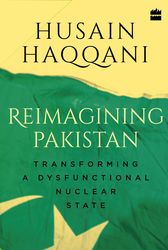Husain Haqqani takes pride in pointing out inconvenient realities. Baiting the Pakistani establishment, Haqqani has always tried to cut through propaganda to speak the truth. His latest book, Reimagining Pakistan: Transforming a Dysfunctional Nuclear State, is in keeping with this tradition.
Haqqani offers a detailed counter to widely held beliefs in Pakistan. “Insecurity remains the hallmark of Pakistan’s political and intellectual conversation,” he writes. This insecurity, which he believes has shaped Pakistan, is what he seeks to examine. Using history to reflect—and as a reference point—Haqqani has traced the journey of Pakistan from the transfer of power to its current avatar of a country described by Madeline Albright as “everything that gives you an international migraine”. Rather than critical reflection, Pakistan chooses denial, says Haqqani, which he attempts to address.
The way Pakistan perceives itself versus the world is flawed, he argues. “One of the most outrageous imagined plots suggests that the flood in 2010 was engineered by the CIA,” writes Haqqani. The world viewed through the prism of religion and firm belief that India is a permanent enemy adds to the distortion.
He also delves into the Pakistani psyche to explain how the country evolved into a dysfunctional nuclear state, using the writing of scholars to bolster his argument. And, he criticises all the actors who have played a role in it—the Pakistani state, the military, the politicians, and even the intelligentsia.
There is busting of several widely-held myths. The Islamisation of politics—the blame cannot be laid solely on General Zia’s door, he writes. Religion-based politics was used by many leaders. But, at the core of his argument is the need for Pakistan to still justify the two-nation theory. He suggests that clinging on to it has prevented Pakistan from seeing itself as part of the modern state. One of the biggest challenges since its creation was “the monumental task of formulating an identity distinct from India’’, he says, quoting historian Mubarak Ali. That, and the belief that India is out to destroy it.
He hopes that Pakistan will find the courage to reimagine itself before circumstances force it to. “On 16th December 1971, Pakistan’s troops were about to surrender in Dhaka while Pakistan’s newspapers were claiming victory,” he says. “The narrative collapsed because of circumstances on the ground in East Pakistan. Wouldn’t it be better if a more honest narrative was allowed? Or at least some people would have been allowed to forward a more honest narrative.’’
Reimagining Pakistan: Transforming A Dysfunctional Nuclear State
By Husain Haqqani
Published by HarperCollins India
Price Rs 699, pages 336


